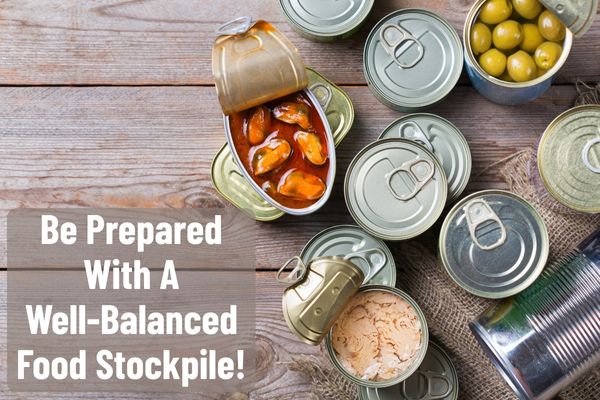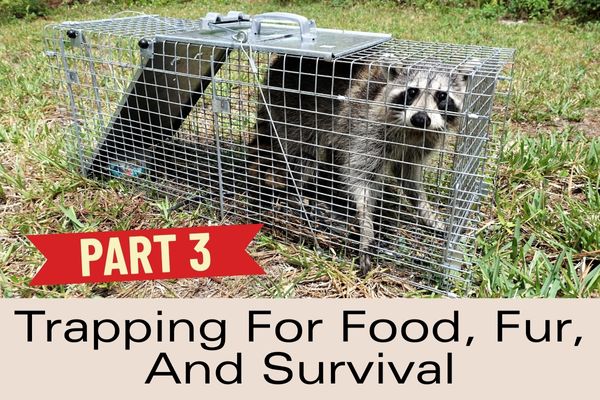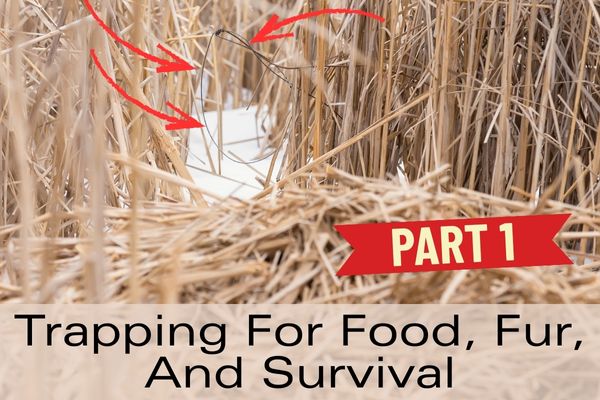Think “Nutritious” When it Comes to Prepper Food Essentials
Should you and your family ever find yourself in an emergency situation, you would need to be well nourished to function at your best.
Whether a person is facing a power loss, post storm (like hurricane, tornado, or blizzard), or earthquake … there’s a chance that the only food supply is the food that’s been prepped.
So, preppers need to create a nutrient-rich survival food stockpile. Processed high-sugar foods contain practically zero nutrients that would help keep you healthy long-term. A nutritious stockpile of food not only provides peace of mind but also ensures your loved ones have adequate nutrition during challenging times.
Advantages of a Well-Balanced Food Stockpile
Your prepper food stockpile should include a balanced selection of nutritious foods that provide and sustain high-energy and help you survive during the aftermath of an emergency.
If someone is lacking the proper nutrients, the ability to stay healthy and function properly can be compromised. Lack of vitamin C combined with inadequate nutrition can hurt your immune system and result in illnesses. Poor iron counts can cause anemia from a low red blood cell count. Lack of Vitamin D and calcium can cause weak bones and high risk of fractures. Vitamin B12 can result in neurological issues.
A stockpile of nutritious foods can keep you and your family well fed and ready to deal with any challenges that an emergency might present. That stockpile can also help keep your family healthy and greatly improve their quality of life.
Nutrient-Rich Foods To Stockpile
Just as you would do if you were starting a new eating plan to improve health or lose weight, you want to be sure your prepper food supply includes foods that offer nutrition. Consider foods that fall into a variety of food types like protein, grains, fruits and vegetables, dairy, spices, healthy fats, vitamins, minerals, and other foods that can help you meet nutritional needs in a crisis.
If you have a bug in scenario, basic food staples allow you to prepare simple meals from your stockpile. Your food supply needs to provide your family with energy, calories, and nutritional building blocks for good health and performance.
Proteins are a great source of energy, known for acting as the building blocks of muscles, enzymes, and hormones. Fiber helps with digestion and gut health. Fats provide energy and are essential for proper brain function.
Assess Needs and Make a Food List
The first step to building a well-balanced food stockpile is to assess your needs and the needs of the people you are responsible for providing food. Also, consider food allergies, dietary restrictions, or food preferences. While building your supply, it’s essential to incorporate a variety of foods to maintain a balanced diet. But it’s also important to have foods you enjoy eating because you’re going to need to keep a healthy morale during an already frustrating situation.
As you assess your prepper food necessities, start writing an emergency food list, an important step of your preparations. And, although natural disasters like hurricanes and snowstorms give advance notice to prepare, the grocery store shelves are usually wiped out very quickly. Think about the different emergency scenarios you’re prepping for and the length of time you may need to turn to your prepper supply. Account for the number of people in your household when calculating how much food to store.
The goal is to develop your own prepper food list to help you stay organized.
What are the Most Essential Foods to Stockpile?
When it comes to prepping, you want to include nutritious, shelf-stable items to create a balanced, nutritious stockpile tailored that your family would find appealing.
Canned foods are ideal for long-term food storage as part of your prepper stockpile.
Here are some foods to consider:
Canned Beans
Canned beans like black, pinto, garbanzo (chick peas), lentils, and red kidney beans are high in fiber, protein, carbohydrates, and some beans even provide essential nutrients like iron, magnesium, and potassium.
Canned Fruits and Vegetables
Fruits and vegetables provide essential vitamins, minerals, and fiber. Canned fruits in water or juice are nutritious and taste great. Include peaches, pears, pineapple, pumpkin, and oranges.
Lots of vegetables are canned and can aid in nutrition and provide food variety including mixed veggies, green beans, carrots, peas, corn, mushrooms, peppers, potatoes, and sweet potatoes.
Canned tomatoes and tomato sauce provide meal versatility whether you’re bugging out or bugging in.
Canned Meats, Fish, and Soups
Canned meats are packed with protein and the canning process allows meat to last up to 5 years without refrigeration. Select canned meats and fish like chicken, spam, sardines, tuna, and salmon. Canned soups, chili, and stews are ready to eat, satisfying, and provide much protein and nutrients.
Condiments, Baking Supplies, Oils, and Spices
Prepper foods don’t have to taste bland. You can add some extra nutrition and taste with condiments, spices, and oils. Consider olive oil, vegetable oil, coconut oil, mustard, ketchup, mayonnaise, maple syrup, or unfiltered honey. Spices like salt, pepper, garlic, turmeric, cayenne, dried herbs, and cinnamon can offer added taste plus powerful antioxidants and minerals.
If you’re bugging in, you could make breads and other baked goods so keep flour, sugar, baking soda, active dry yeast, and baking powder in your food supply.
Freeze Dried and Dehydrated Meats, Fruits, and Vegetables
Freeze dried fruits and vegetables have a long shelf life and provide fiber and vitamins. Make sure to stock dried fruit like raisins and cranberries and freeze-dried vegetables such as carrots, peas, beans, and tomatoes. Freeze-dried meats (like beef and turkey jerky) are filled with nutrients and protein.
Dehydration retains most nutrients and flavors and keep foods for many years. Dehydrated apples, strawberries, mangos, plantains, and banana chips are nutritious and make a great snack.
In this category, you can also add MREs also known as “Meals Ready to Eat” to your prepper food stockpile. MREs are packaged pouches featuring full entrees and sides. Some MREs are self-heating when water is added. MREs are typically utilized by the military, survivalists, and outdoor enthusiasts.
Nuts, Peanut Butter, and Seeds
For additional sources of protein, vitamins, fats, and minerals – add nuts, seeds, peanut butter, and other nut butters to your prepper food stockpile. Select a large variety of options including peanuts, pecans, almonds, walnuts, sesame seeds, pumpkin seeds, and chia seeds.
Shelf-Stable Milk and Other Dairy Alternatives
Consider adding powdered milk, evaporated milk, plant-based or nut-based milk non-refrigerated cartons, and condensed milk into your prepper food supply. This will provide an extra source of calcium, Vitamin D and protein.
Snacks
You should consider some snack foods in your well-balanced stockpile. Select snacks that your family enjoys like hard candy, protein bars, granola bars, meal replacement bars, trail mix, crackers, cereal, and popcorn. Comfort foods in moderation can boost morale during an emergency.
Whole Grains, Rice, and Pasta
Whole grains like pasta, rice, rolled oats, wheat, and quinoa, are outstanding sources of carbohydrates and minerals.
Nutritional Supplements and Multi-Vitamins
While it’s great to have a nutritious stockpile of foods, it would be even more advantageous to take a daily multivitamin to fill any nutrition deficiencies when food is scarce. You want to ensure your body has enough vitamin C, D, iron, zinc, and magnesium.
If lots of physical activity will be required during an emergency, add electrolyte powders and energy drinks to your prepper stockpile to help replenish any lost minerals.
Become More Self-Sufficient by Growing Your Own Food
It’s no secret that freshly grown vegetables and fruits are nutritious and delicious. Consider growing your own food whether you can have a full vegetable garden and fruit trees or create a container garden. In a disaster situation, think how welcome it would be to pick blueberries, tomatoes, apples, potatoes, carrots, herbs, peppers, zucchini, or other fruits and vegetables right where you live.
Continually Maintain Your Well-Balanced Food Stockpile
Preppers must diligently rotate food items to move up items that will expire first. The only way to ensure freshness of your food stockpile is to continually monitor expiration dates so you do not eat spoiled food should an emergency arise. Also, reassess your food stockpile to see if you need to replace certain foods based on your family’s necessities or likes.
A Well-Balanced Food Supply is Critical For Every Prepper
There are so many important aspects of prepping, but food and water are critical for long-term health and survival.
Prepping an emergency food supply can feel overwhelming at first. Take your time and don’t feel the need to buy everything all at once. Start now by slowly building up essential food supplies and continually add items, always being careful about filling nutritional needs.
Once you establish a well-balanced stockpile, you will feel more confident that you’ll be able to properly care for your family. And that peace of mind is priceless.




